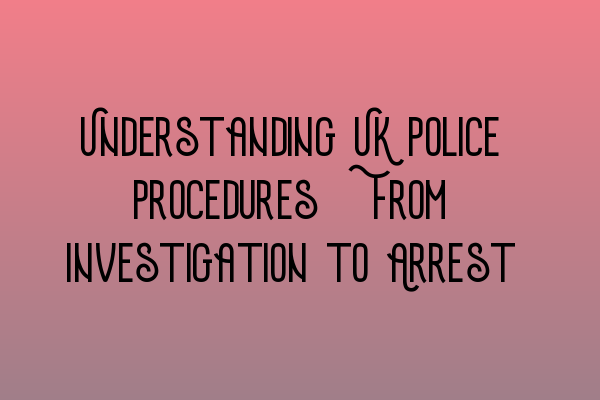Understanding UK Police Procedures: From Investigation to Arrest
When it comes to criminal law in the UK, it’s important to have a clear understanding of the police procedures involved from the initial investigation all the way to arrest. This blog post aims to provide you with an overview of these procedures, helping you navigate the legal landscape with confidence.
The Investigation Stage
Every criminal case starts with an investigation, which is conducted by the police. The purpose of the investigation is to gather evidence and information related to the alleged crime. This involves conducting interviews, collecting physical evidence, and analyzing any available data.
SQE 1 preparation courses can help aspiring solicitors understand the legal frameworks and principles that govern police investigations. These courses emphasize the importance of following proper procedures during the investigation stage to ensure a fair and just legal process.
The Arrest
Once the police have gathered sufficient evidence, they may choose to make an arrest. An arrest is the act of taking a person into custody and legally detaining them. It is an important step in the criminal justice process, as it allows the police to further investigate the alleged crime and present their case to the court.
It’s crucial for both law enforcement professionals and aspiring solicitors to have a solid understanding of the legal requirements and limitations surrounding arrests. Courses such as SQE 2 preparation courses provide comprehensive knowledge on arrest procedures, ensuring that legal professionals can effectively represent their clients during this critical stage.
Legal Rights of the Accused
Once a person has been arrested, they are entitled to certain legal rights. These rights ensure that individuals are treated fairly throughout the criminal justice process. Some of these rights include the right to legal representation, the right to remain silent, and the right to be informed of the nature and cause of the accusation.
Understanding these legal rights is essential for both the accused and legal professionals involved in criminal law cases. SRA SQE exam dates and courses covering criminal law prepare solicitors to advocate for their clients effectively, ensuring that their rights are protected.
The Role of a Solicitor
A solicitor plays a crucial role in the criminal justice process. They are responsible for providing legal advice and guidance to their clients, representing them in court, and ensuring their rights are protected throughout the proceedings.
Law firms that specialize in criminal law, such as SQE Criminal Law & Practice Law UK, offer qualified solicitors who have extensive knowledge and expertise in navigating police procedures. These solicitors are trained to analyze evidence, assess the strength of the case, and develop an appropriate legal strategy.
Conclusion
Understanding UK police procedures, from investigation to arrest, is vital for both law enforcement professionals and aspiring solicitors. By having a comprehensive understanding of these procedures, legal professionals can provide effective representation to their clients and ensure a fair legal process.
If you’re considering a career in criminal law, it’s important to invest in the right education and training. SQE 1 practice exam questions and SQE 1 practice mocks FLK1 FLK2 can help you prepare for the Solicitors Qualifying Examination, ensuring that you have the knowledge and skills to excel in your legal career.
At SQE Criminal Law & Practice Law UK, we offer comprehensive SQE 2 preparation courses and SQE 1 preparation courses that cover all aspects of criminal law. With our expert guidance and resources, you can develop the necessary skills and knowledge to succeed as a solicitor in the criminal law field.
